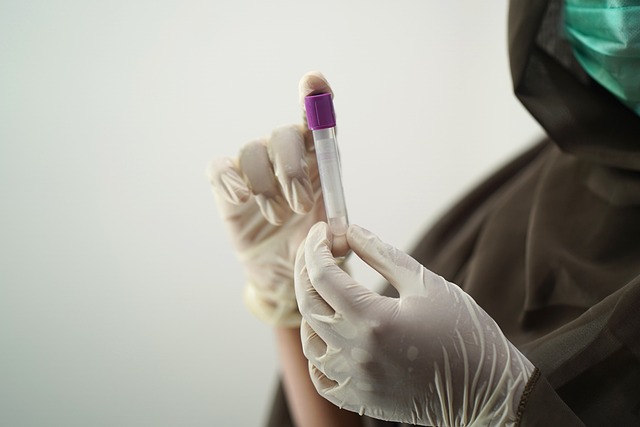The relationship between testosterone and male fertility is a key aspect of men's hormonal health, influencing sexual differentiation, reproductive function, and spermatogenesis. In the UK, assessing this involves a suite of tests including serum testosterone levels, LH, FSH, and prolactin measurements to diagnose any imbalances or deficiencies affecting fertility. Adequate Vitamin B12 levels are also crucial for male reproductive health; the UK emphasizes the importance of this nutrient due to its role in DNA synthesis, cell division, and red blood cell production. Low B12 can lead to anemia and reproductive issues, including infertility. Therefore, a Vitamin B12 Blood Test UK is integral to evaluating male fertility. The NHS advocates for dietary measures and supplementation when necessary. This test is non-invasive and vital for early detection of deficiencies that could impact sperm quality and quantity. By integrating this test into the diagnostic process, the UK's healthcare system supports a comprehensive approach to male reproductive health care, emphasizing the significance of Vitamin B12 in maintaining fertility and overall well-being.
Men’s reproductive health is pivotal to fertility and overall well-being. Analyzing male hormone levels emerges as a critical diagnostic tool in identifying reproductive issues. This article delves into the intricacies of male hormonal balances, emphasizing the impact on fertility. We explore the significance of Vitamin B12 in maintaining reproductive health from a UK standpoint, shedding light on its role and benefits. Additionally, we will guide readers through the appropriate times to opt for a Vitamin B12 Blood Test within the UK’s healthcare system, as part of a comprehensive approach to diagnosing and addressing reproductive concerns.
- Understanding Male Hormone Levels and Their Impact on Fertility
- The Role of Vitamin B12 in Maintaining Reproductive Health: A UK Perspective
- Diagnostic Approaches for Reproductive Issues: When to Opt for a Vitamin B12 Blood Test in the UK
Understanding Male Hormone Levels and Their Impact on Fertility

Male hormone levels, particularly testosterone and other androgens, play a pivotal role in sexual differentiation, reproductive function, spermatogenesis, and overall male health. Testosterone is the primary male sex hormone, responsible for the development of male characteristics during puberty and for maintaining various physiological processes throughout adulthood. Its levels are indicative of male fertility; suboptimal testosterone can lead to issues such as decreased sperm production, reduced libido, and a heightened risk of infertility.
In the UK, assessing male hormone levels involves a range of tests, including the Vitamin B12 Blood Test UK, which is not exclusively related to hormones but is crucial for overall health and can impact fertility indirectly. Vitamin B12 is vital for DNA synthesis and the production of red blood cells; deficiencies can lead to anemia and a host of other health issues that may affect reproductive function. For men experiencing fertility problems, a comprehensive evaluation by a healthcare provider typically includes hormone level assessments, such as serum testosterone tests, luteinizing hormone (LH), follicle-stimulating hormone (FSH), and prolactin levels. These tests can help identify any hormonal imbalances or deficiencies that may be contributing to reproductive issues. Understanding the interplay between these hormones and their impact on fertility is essential for diagnosing and treating male infertility effectively, leading to improved outcomes and overall well-being.
The Role of Vitamin B12 in Maintaining Reproductive Health: A UK Perspective

In the United Kingdom, the role of Vitamin B12 in maintaining reproductive health has garnered significant attention within medical circles and among individuals seeking to optimise their fertility. Adequate levels of Vitamin B12 are pivotal for various biological processes, including DNA synthesis, cell division, and the production of red blood cells. Deficiencies in this vital nutrient can lead to a range of reproductive issues, such as unexplained infertility, recurrent miscarriages, and suboptimal spermatogenesis in males. The implications are profound; thus, regular Vitamin B12 blood tests are advocated for those with suspected deficiencies or reproductive concerns. These tests enable healthcare providers to measure the concentration of this nutrient in the bloodstream and determine if supplementation is necessary. For men specifically, maintaining sufficient B12 levels is crucial as it supports sperm quality and quantity, which are essential factors in conception.
The UK’s public health guidelines emphasise the importance of dietary intake and, where necessary, medical intervention to address Vitamin B12 deficiencies. Food sources rich in B12, such as meat, fish, and dairy products, are recommended; however, some individuals may require supplementation due to absorption issues or dietary restrictions. The National Health Service (NHS) provides guidance on the interpretation of Vitamin B12 blood test results and offers treatments like B12 injections for those with confirmed deficiencies. This proactive approach underscores the UK’s commitment to addressing reproductive health concerns through informed medical practices and accessible healthcare services. It is through such comprehensive measures that the UK continues to advance its understanding of the interplay between nutrition, particularly Vitamin B12, and reproductive health outcomes.
Diagnostic Approaches for Reproductive Issues: When to Opt for a Vitamin B12 Blood Test in the UK

In the UK, diagnostic approaches for reproductive issues often involve a multifaceted evaluation to identify underlying hormonal imbalances or deficiencies that may affect fertility. Within this spectrum of diagnostics, the Vitamin B12 Blood Test emerges as a pivotal tool in assessing overall health and specifically, its impact on male reproductive function. This test measures the levels of vitamin B12, an essential nutrient for DNA synthesis, cellular metabolism, and red blood cell formation. When a man presents with symptoms suggestive of reproductive issues, such as decreased sperm count or motility, or experiences unexplained fatigue or changes in mood, healthcare providers may consider a Vitamin B12 Blood Test UK. This is particularly relevant given the prevalence of subtle B12 deficiencies that can go undetected yet significantly influence fertility outcomes. The test provides quantitative data on vitamin B12 levels, allowing for informed clinical decisions. If deficiency is confirmed, dietary modifications or supplementation may be recommended to optimize reproductive health and address any contributory factors to reproductive issues.
The decision to opt for a Vitamin B12 Blood Test UK should be guided by a thorough medical history and clinical examination. It is important for healthcare professionals to consider this test when evaluating male patients with suspected reproductive issues, as B12 deficiency can be associated with a variety of reproductive health concerns. The test is non-invasive, relatively straightforward, and offers clinicians valuable insights into the individual’s biological status. Early identification of B12 deficiency through this test enables timely interventions that can significantly improve fertility outcomes and overall well-being. Thus, integrating the Vitamin B12 Blood Test UK into the diagnostic protocol for reproductive issues is a step towards more comprehensive care and better patient outcomes.
In conclusion, the analysis of male hormone levels, particularly through the Vitamin B12 Blood Test UK, stands as a pivotal diagnostic tool for addressing reproductive issues. Understanding the nuances of hormonal influences on fertility and the role of nutritional components like Vitamin B12 in maintaining reproductive health provides healthcare professionals with a comprehensive framework to effectively diagnose and manage male infertility. The insights gleaned from these diagnostic approaches underscore the importance of personalized medicine in the UK, ensuring that men receive the care and treatment necessary to overcome reproductive challenges. With such precise and accessible testing options available, the path to parenthood for many can be significantly improved.
